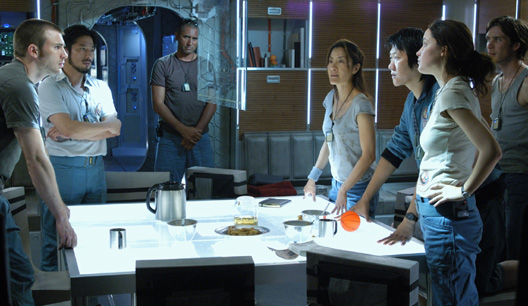 [Image: The cast of Sunshine; courtesy of DNA Films].
[Image: The cast of Sunshine; courtesy of DNA Films].
I saw Sunshine the other day, so I thought I’d offer a few thoughts about it here. However, please beware that this post gives away key plot details and spoils the end of the film – so do not read this post if you’d like to avoid such knowledge.
In brief, myself and two friends went to see the film together – and we had three totally different reactions. One of us was basically annoyed with it from the very beginning – and a weird plot twist, that I’ll soon discuss, about 5/6ths of the way through the movie, just killed it for him; the other more or less liked everything about the film, even accepting said “weird plot twist” for interesting reasons of his own; and I really liked the film, with several reservations, until, yes, the aforementioned weird plot twist – which basically does the whole thing in for me. In fact, I’m still stunned that this one particular detail ever made it into the script.
In any case, what the film does – and it does this very successfully, in my opinion – is set up an increasingly melancholy sense of psychological isolation as an international crew of scientists, aboard a ship called the Icarus 2, flies toward the Sun. The Sun, we learn, is dying – and so it needs to be restarted with a “stellar bomb” the size of Manhattan. In fact, we learn, the bomb is so big that it contains literally all of the Earth’s fissile material. Once detonated, it will form “a star within a star” – a surrogate astronomy, or Sun-replacement surgery, that will save everyone back on Earth from the perpetual winter in which they’ve been trapped.
Whether or not this would actually work, from the standpoint of an astral physicist, is beside the point; you’re asked to accept this, as the basic plot of the film, and, as far as that goes, I accepted it.
Meanwhile, the visual and conceptual beauty of certain scenes – they witness a transit of Mercury, for instance – is extraordinary. Further, the possibility that they may not make it back to Earth, though still unlikely at the film’s beginning, adds a distinct aura of extinction and exclusivity to everything they see.
No one will ever see these things again.

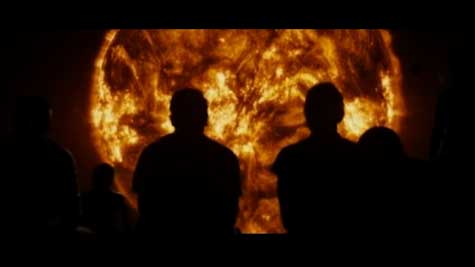
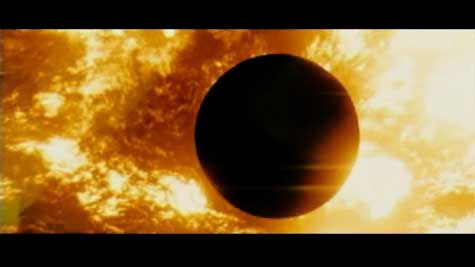 [Images: Screen-grabs from the Sunshine website; courtesy of DNA Films].
[Images: Screen-grabs from the Sunshine website; courtesy of DNA Films].
However, as the ship approaches its solar rendezvous, a kind of elemental, alien hostility begins to emerge – not from within the crew members, but from within the Sun itself. Far from being a beneficent source of light in the sky, generously tanning the bodies of we Earthlings below, the Sun is revealed as a monstrous and abiological source of mutative radiation, inhumanly immense, so bright you can’t see it, disintegrating nearly everything that comes near.
One of the crewmembers – the resident psychiatrist – becomes addicted to the star: he can’t stop burning himself with more and more quantities of sunlight, asking the ship’s central computer to increase the unfiltered percentage that is allowed through the observation deck window. With his skin peeling and his mouth hanging open, he nearly disappears into a void made entirely of light – golden, enveloping him on all sides – yet we hear, incredibly, that he’s only receiving 3.1% of the Sun’s natural capacity. 4%, we’re told, would destroy the psychiatrist outright – let alone 50% or 90%, or the Sun itself, unfiltered.
In fact, for me, the film very brilliantly illustrates the paradox that something can be so powerful that the ability to experience it is simply beyond the limits of human life – outside of human experience altogether.
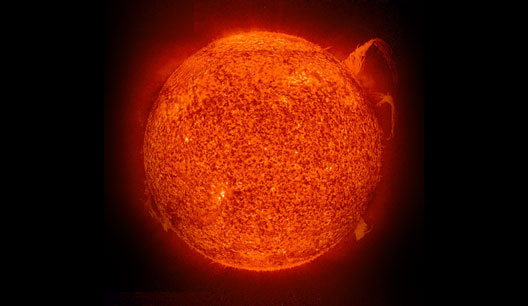 [Image: The sun].
[Image: The sun].
Anyway, if the first 4/5ths or even 5/6ths of the film are about this painfully beautiful, almost evaporative, encounter with an alien and threateningly vast – yet so ironically necessary to life on Earth – stellar object, then the “weird plot twist” that I mentioned above feels as if the ending to another film had been accidentally stitched on in the editing room.
In brief: Sunshine suddenly turns into The Texas Chainsaw Massacre.
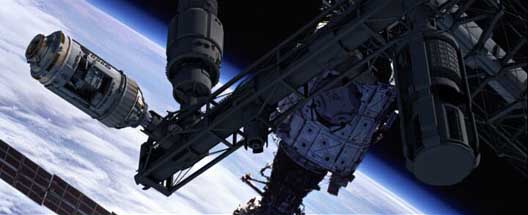 [Image: The ship from Sunshine; courtesy of DNA Films].
[Image: The ship from Sunshine; courtesy of DNA Films].
It’s as if the film shies away from its own material, unable, or unwilling, to contemplate what might happen if people, aware of their own impending deaths, fly straight into the Sun – an origin point devoid of recognizability – and so they throw a serial killer in, almost literally out of nowhere.
The film could have been stunning: the crew is pared down, one by one, by accidents or oxygen shortages, and even a suicide, until only three or four of them are left. They know that they will never return; they know that they will die unprecedented deaths, obliterated by Apollo, by God, by the Sun – by whatever you want to call it; and they are terrified by that rapturous undoing, unable to narrate their final experience for anyone back home, truly cut off yet almost psychedelically alive in this moment of solar contact…
But that’s not how the film ends.
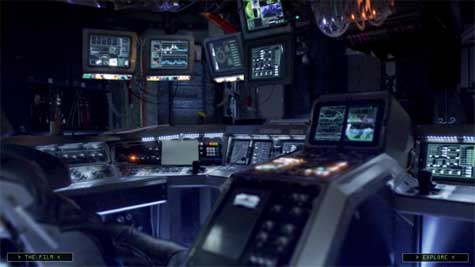 [Image: The flight deck from Sunshine, in a screen-grab from the film’s website; courtesy of DNA Films].
[Image: The flight deck from Sunshine, in a screen-grab from the film’s website; courtesy of DNA Films].
Midway through Sunshine, a distress beacon is heard. It’s from the mission before their mission – the one that failed. That ship – called Icarus 1 – disappeared nearly seven years ago, somewhere in the irradiated gulf between Mercury and the Sun.
In a decision that, I’ll concede, is necessary for certain things to come but is still so ridiculous as to make viewers question the competence of the entire crew – the last great hope of humanity! – they decide to deviate their mission in order to find the lost ship.
Lo! They find the lost ship.
Lo! They know exactly how to dock with it, despite – for obvious reasons – never having practiced anything of the sort.
Lo! Unbeknownst to them, the captain of the Icarus 1 is still alive – and he hides out on the Icarus 2, escaping notice. Like a comic book superhero, he’s survived seven years alone on a disabled spaceship floating between Mercury and the Sun – without being pulled in by that star’s gravity. As if serving simply to make the film’s existential themes explicit, he has also pre-recorded an angry and completely unhinged theological rant about God’s Will and the absurdity of Man trying to restart the Sun.
Even more unbelievably, it turns out that this guy isn’t malnourished, semi-skeletal, or even psychologically catatonic: no, after seven years alone, eating hydroponic carrots in space, he’s become a superstrong, sunburnt Hercules, capable of lifting two crewmembers at a time with one arm whilst chasing everyone else down and murdering them with a mechanized surgical scalpel.
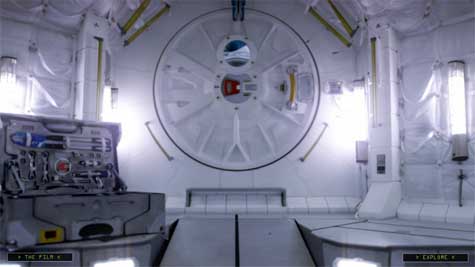
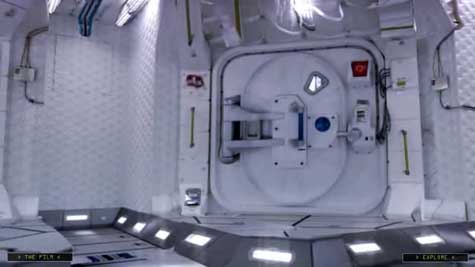 [Images: Two views of the airlock from Sunshine, in screen-grabs from the film’s website; courtesy of DNA Films].
[Images: Two views of the airlock from Sunshine, in screen-grabs from the film’s website; courtesy of DNA Films].
Where did this come from?
And why?
At the risk of wildly exaggerrating the philosophical depth of the first 5/6ths of the film, this seems roughly akin to throwing in a serial killer for the last three chapters of Thus Spoke Zarathustra – Nietzsche is chased through the claustrophobic rooms of his mountain home – or adding the Son of Sam to the grand finale of the Tao Te Ching.
In any case, can you really be so scared of your own premise – the unwitnessed and lonely deaths of an oxygen-starved crew as they fly into the Sun, toting a “stellar bomb” the size of Manhattan (talk about mythological plotlines!) – that you have to add Freddy Krueger?
Even worse, the film had already established by then that no one would survive. The film had already established that the Sun was a source of great attractive power, far beyond the mere pull of gravity, and that it was possible to become hypnotized by, even addicted, to the very thing that would later annihilate you – and that this death would be more horrible than human pain can describe, yet something of such exquisite agony, and so spectacular, something uniquely sublime in the history of human experience, that you would actually want to feel it.
You would fall toward roiling continents of hydrogen and light, and you would be utterly consumed by your destination.
It would have been the science fiction film of the decade! An instant classic.
Instead, just when everyone has settled in for the ending, waiting for that golden burn, our mutant Hercules of unlimited arm strength appears, creeping up behind people in the dark and knifing them in the spine.
How could you cheat the audience and the characters out of the philosophical glory of solar absorption? Sunshine would practically have been a religious text, a near classic work of speculative philosophy exploring what it means not just to die but to be completely obliterated, atomically consumed in chemical radiance by the same two-faced point of origin that makes life on Earth possible in the first place.
Imagine if the Chandogya Upanishad ended not with the nature of time, space, life, and astronomy – but with an ax murderer.
Or Siddhartha: the Buddha is inexplicably hunted by an escaped convict with a chainsaw… (That sounds kind of fun, actually).
Does this mean that I am comparing the film Sunshine to the Chandogya Upanisad? Well… I suppose I am, out of over-enthusiasm – but I am also saying that Sunshine wildly misses that mark. Instead of going for cinematic magnificence, and it was well on its way to arriving there, it takes a disastrous step back – and reveals itself as a cheap, quasi-1990s space-horror misfire.
Was the knife-wielding lunatic evidence of tampering by the studio? In other words, did the film’s producers demand more of a predictable impact? Or did Alex Garland write that guy into the original script? If so, why? Were the filmmakers pleased with the final result? Were they so unhappy with the idea of flying their own crew into the Sun that they added an interstellar He-Man, sunburnt and stronger than Arnold Schwarzeneggar?
Or was the knife-wielding lunatic a way to screen the filmmakers themselves from the imaginative power of their own subject matter?
Was there something about the premise itself – total absorption by a featureless, golden void – that forced them to retreat, and to insert something that they and, they hoped, the audience could recognize?
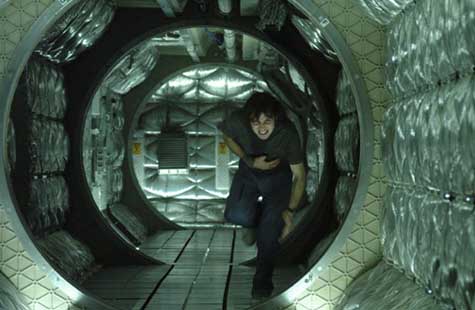 [Image: Cillian Murphy runs from a knife-wielding, sunburnt lunatic in Sunshine, a screen-grab from the film’s website; courtesy of DNA Films].
[Image: Cillian Murphy runs from a knife-wielding, sunburnt lunatic in Sunshine, a screen-grab from the film’s website; courtesy of DNA Films].
Like I say, if the film hadn’t already been on its way to the final credits, with no need for such a plot twist, I could perhaps have accepted the chromosomally damaged avenger. If it had been the ship’s resident psychiatrist, for instance, psychotically consumed by the Apollonian power of astral radiance, at least it would have been neat and tidy – if still clichéd.
But since we were already on our way into the Sun, already past the point of even thinking that the crew might return home, already accepting the fact that everyone in the film would die heroic, astronomically unprecedented deaths, why did we need the murderous accelerant of a Sun-addled stowaway?
That does nothing more than rob the film of its poetic grandeur – so that the filmmakers could safely turn their back on philosophy and create Leviathan in zero-G.
(Thanks to Christopher and Michael for seeing the film with me – and for listening to me rant about all of the above for nearly two hours. Meanwhile, if you completely disagree with this review, please jump in and convince me otherwise. Earlier on BLDGBLOG: The Oxygen Garden).
im sorry, i would comment but you blew my mind open at “chemical radiance.” i’ll have to come back later when i’ve recovered at a bit…
Take some Advil – then jump back in! I’d love to hear your thoughts again.
This disappointing film reminded me very strongly of “Event Horizon”, with its depiction of human evil sabotaging the noble endeavour. I also found everyone onboard unsympathetic and their petty squabbles unrealistic in light of their mission to save the Earth. I’d say this was “Event Horizon” meets “The Core”, only that combination would still be better than this. A pity, because Danny Boyle and Alex Garland are capable of better work.
The photography and set design were great, however.
Greg
It’s funny, my friends mostly loved it… They were looking for entertainment whereas I too saw promise of a classic. The film totally lost my respect, however, from the moment they decide to deviate their course.
What about the rediculously unnecessary not-subliminal flashes of sunburnt arnies face?
I’m also not sure I understood the bit at the end where time stops… Was this supposedly because they are travelling so fast? Would it not also be unfeasibly hot accelerating into the sun inside an exploding ball the size of manhattan? The plot-twist and ending simply contradict the rest of the film.
I was in love with this movie up until the “twist”, which I managed to look past due to what I find to be a fantastically beautiful movie. The twist fits in perfectly with the movie, but was done horribly (it could have been done a lot better):
SPOILER
I don’t think it was ever mentioned in the movie, but in an interview Daniel Boyle mentions that Capa is an atheist (becoming so in his studies much like Cillian Murphy did researching his character for the movie). Pinbacker (the sun burnt captain from Icarus I) believes himself to be a servant of his gods word. The last fifth of the movie is supposed to be this sort of contrast of science and religion and how the faith in each had been distributed by the crews of each mission.
Spoiler
Overall, I loved this movie and can easily look past what I think is the one mistake in the entire thing. I’m sure it’ll end up being one of my favorites in the long run.
the finer complexities of sci-fi deep space popcorn flicks will always fall short thanks to Mr Kubrick… and/or… cinemas are fitted with rockets and our DTS surround is wistfully consumed in a blue haze lunar orbit…
Sunshine 2025 (as so in Japan) great visually but yeah, I saw it coming the moment the distress beacon hailed…
SPOILER – George Lucas is the bad guy… or is it the audience?
yeah, you hit the nail on the head. the film’s real and desired headiness devolves into a cheesy music video towards the end. all those fuzzy shots and jumpcuts were just ornaments and distractions to cover up the underlying goofiness.
the murderer-in-deep-space of 2001 (a movie which sunshine quotes quite a bit of), a cold, utterly dispassionate machine, was infinitely more chilling to me than crazy skin cancer man.
interesting also to compare sunshine to boyle / garland’s more successful 28 Days Later, which is structured kind of in the reverse; it begins as a thriller (a very elegant one at that), and then decelerates somewhat to become an eschatological headtrip in the final act.
[for the record i was the friend that was annoyed from the beginning of the film 😀 ]
everything i would say about the plot has been said. ironically i think the film’s progressive recession from logic works better as a meta-model of how difficult it is to write a movie about flying into the sun.
the almost comical ineptness of the plot, the beautiful and obsessive attention to the physical aspects of the journey, all represent a wonderful map of the gradual breakdown of an author’s mind as his script continues to hurtle towards a rendezvous with oblivion with no relief or purpose in sight.
it’s ‘adaptation’ colliding with ‘solaris’.
I knew the psycho was coming from the moment they received the distress beacon as well. Okay, maybe not a sunburned serial killer, but did you really think that they weren’t going to find a person on that ship? The appearance of the first ship was the antagonist of the story. The psycho wasn’t tacked on to the end in my opinion. The epic struggle that almost doomed the world would NEVER be known to those on Earth. To all of humanity, they would all be remembered as heros, including the psycho killer. The ending was heart-pounding, sobering, surreal, and near perfect in my opinion.
aside from the sometimes stunning visuals and the ending that made up for some of the rubbish they made us swallow: How can they make a Science Fiction flic without even the most basic understanding of science? I was hoping to just once see a “hard sf” film and not the fantasy in space in the likes of Star Wars, or horror in space like Event Horizon. Which was even worse.
Aside from the stupid sunburn maniac: Where did the gravity come from? Don’t they have a thermostat and/or a computer on board which would give an alarm if they decided just for the hell of it to forget to re-adjust the shields, apparently the most basic surival neccecity so close to the sun? And no sprinklers in the oxygen garden? And then the whole setup and not telling us why the sun is “dying” in the first place, like adding a grain of fission matter would help a star running out of oxygen to burn. I would have accepted the premise if the rest were just a bit coherent.
Sunshine was beautiful but disturbingly stupid. Apart from the remarks above: why in the first place did they need to bring a whole crew to guide a bomb straight into the sun? Not a very complex task, obviously.
And how could they be out of oxygen, when they had a whole room the size of manhattan full of – apparently – breathable air?
A stupid plot. But the sun itself was still worth it.
bongo’s criticism is on target and it’s why the deranged killer is an essential part of the film. I had the same reaction you did to the appearance of the deranged killer. Up to that point, Sunshine was on its way to being a fairly decent, scientifically grounded (somewhat) catastrophe film. And I thought it was doing fairly well on those terms. I was even willing to buy into the diversion to Icarus I.
Perhaps the diversion to Icarus I was foolish in the logic of the film’s world, but without the diversion there is no film. And while I felt like screaming “no, don’t go there!”, my reaction is akin to shouting at Romeo “don’t drink the poison!” or telling Oedipus to only sleep with younger women.
The film is concerned with the conflict between religion and science, and the deranged captain represents religion. Capa and the Icarus II crew represent science, and the conflict results from the ongoing conflicts between the two. Without the interference of the captian, survival of the mission would have been possible. This twist represents the creators’ negative attitude towards the influence of religion in society.
I think that this conflict could certainly have been done in a better way, but I think that it is an essential part of what the filmmakers were trying to do. They just botched it.
For those quibbling about details regarding oxygen and gravity: I don’t have any problems with the oxygen shortage from a scientific standpoint and, while I do have immense problems with the decision to ignore gravity completely from a scientific standpoint, I accepted it for the sake of the film. One cannot very well make a film about flying into the sun if one remembers that the gravitational field of the sun would compress all the humans into piles of goo long before they reached the solar atmosphere. I figure the film did a reasonable job dealing with the sun’s heat and light, and just decided to ignore the radiation and gravitation.
As for the oxygen: the question is not whether there is any oxygen left, but whether there is enough for human lungs to process it. Yeah, there were some big empty rooms on the ship, but they were also on the mission for a very long time. *shrug*
The Sun’s immense gravity has no effect if they are in orbit around the sun, or falling into it. In both cases, they are in freefall, and experience weightlessness.
It’s a film, not an architectural thesis. Simply put, you’re all taking it way too seriously, losing all sense of entertainment and suspension of disbelief by nitpicking over details of the film like it was a first year student’s first sketch model. Furthermore, you’ve made many unfair and unreasonable comparisions to other genres and films rather than remaining within this film’s given context.
The ghost of the Icarus I and its captain were foreshadowed in the beginning of the movie. There was nothing surprising about it, nor was the maniacal captain’s rampage a bloodfest akin to any slasher flic, considering only 1 member of the crew dies by his hand, and another dies as a consequence of trying to repair his sabotage. Were there plot holes? Sure. I can’t imagine any engineer in their right mind would’ve made the manual override for the coolant/mainframe device INSIDE the coolant tank. But so what? The film entirely addressed many of the psychological and philosophical themes, but you seem bothered that it chose not to stay within a science fiction genre by jumping to horror. I would argue that the film was never about being strictly science-fiction, suspense, or horror to begin with. It used the tools of those trades, so to speak, in order to tell a entertaining, visually stunning, tense, exciting, and thoughtful film all at once. Without it there would be no film…only a mere intellectural treatise or lecture on man’s place within the universe. Next time you watch it, relax, and enjoy the ride. 🙂
… and I’m the one who accepted the “weird plot twist.”
And, actually, the more I think about it, I accept it even more. Sure, it was overblown, but it did make sense to me to have Pinbacker be completely insane (and, sure, have extra-human strength).
Thanks for inviting me out there with you. I had a great time.
The whole time, right up until the end, I’m thinking, “Please don’t go back to Earth for the ending, please don’t cut back to Earth for the ending. Just end it on the ship with Cillian touching the wall of light.”
But then Boyle cuts back to earth, because we have to have the ray of hope we were denied for the entirety of the film. Weak.
But worse was the name of the ships! Why the hell would humanity name the ships that are supposed to save Earth after perhaps the most well-known ill-fated mythological experiments?! It seemed doomed before it even began!
A better name for the ships: Rescue Dawn.
I haven’t seen this movie; it doesn’t sound very good but the pictures sure are pretty.
But your review, about the beginning, before the serial killer guy comes in, really reminded me of Dante’s Paradiso, which I read recently. (Like everyone, I’d only read the Inferno, and I decided to read the rest.) There is quite a bit about how the full power of the light he’s heading into would be too much and destroy him without protection. I know everyone thinks that book is totally boring, and there certainly are some boring parts, but given this review, it might appeal to you.
sorry for being completely off-topic,
but how do you manage to write this much interesting stuff. if i could i would read your blog all day until i fall asleep or worse 🙂
ow and i really enjoy the articles you write about sound related subjects, i hope you keep those coming!
arnoud traa
sound designer, amsterdam
Coincidentally*, the new Doctor Who series did a pretty good story this season about a ship that was on course to plunge into a sun, with a crew being killed off one by one by maniacs in their midst.
However, that story (called “42” because it unfolds in real time — the 42 minutes of the episode’s duration) comes up with a much more direct link between the collision with the sun and the killers on the ship. Spoilers ahead:
It turns out that the ship had refueled itself by extracting material from the star itself. Said star turned out to be a living entity — and it was enraged by this trespass. The maniacal crew members (including the husband of the captain who decided to scoop up the stellar fuel) have been possessed by the sun itself (and wear welding masks to conceal their flaming eyes).
Scientific rubbish, of course, but a tight, consistent, and emotionally cohesive story.
*The production staff of the show have said that their script was written before they ever found out about “Sunshine”.
Here’s Anthony Lane commenting: http://www.newyorker.com/arts/critics/cinema/2007/07/30/070730crci_cinema_lane
From the New Yorker review (thanks, Joerg!):
“We are invited to worship the sun both as lifegiver, for those left behind on Earth, and as a kind of annihilating deity; when one spacewalker drifts beyond the limits of the sunshield and catches a direct blast of solar ray, there is a tiny pffsst, and he boils away to nothingness, like a waterdrop on a stove. I am a sucker for such grandeur, and I wish that Boyle hadn’t spoiled it by turning his film into a mad, overcooked exercise in stalk and slash. Was this the only way to stop the kids from walking out of the cinema? Whatever the case, his change of tack feels jagged with impatience and panic. Villainy descends upon the spaceship, but so pressing is the question of why and how it got there, and what factor sun cream it must have been lathering on, that Boyle tries to disguise the uncertainty with visual effects, smearing almost every shot into a distorted haze. Beware of filmmakers who shy from clarity just when we need it most, and ask yourself what happened to the Danny Boyle who offered that unflinching view of drug abuse in ‘Trainspotting,’ with its scabrous highs. He has not so much taken leave of his senses, I think, as allowed them to overwhelm him. Blame it on the sunshine.”
+++++++++++
In any case, personally, I feel that not responding to the Icarus 1’s distress call would have been a much more emotionally shattering experience for the crew – truly taking leave of their human compassion and even their human identity in this encounter with the Sun. And I also feel that there would have been enough of a film without throwing in Freddy Krueger – there could have been any number of technical problems that would have prevented the crew from making it back to Earth, for instance, and so their mortality, and their awareness of that mortality, coming to them in the form of radiative disintegration in the Sun, would have given the film a maturity that I would have respected and remembered.
Instead, right when you’re about to encounter this alien, inhuman thing – the Sun, reacting with itself in space – the filmmakers chicken out. They blot out the Sun with this crazy, carrot-fed slasher and his pockmarked, sunburnt skin, and they step back from any sense of cinematic ambition so that they can re-make the hospital scenes from Halloween 2.
Maybe a new version of Gandhi can come out in the next few years: instead of just being shot at the end, Gandhi can start leading paratrooper missions into the jungles of eastern Colombia. That wouldn’t be too much of a transition from the rest of the film, would it?
Wait, the maniac is named “Pinbacker”? Someone’s just messing with you, then, and the movie was never intended to be any good.
Geoff, that’s the first review of Sunshine that I completely agree with. A film that was heading towards being a classic until the writers panicked and threw in a literal monster where the psychological one would have been more than enough.
If and when I re-watch, I’m likely to hit the eject button on the DVD at the point where things start to get silly.
Alex Garland did name Pinbacker as a deliberate reference to Dark Star’s Pinback. A very bad decision, I’d say. I’d agree with pretty much everything in Geoff’s review (not at such eloquent length, obviously) – I was hugely enjoying the film right up to That Moment, when it all just seemed very stupid indeed for a while.
A large part of the problem, I suspect, is that Garland just can’t do endings – consider ‘The Beach’. ’28 Days Later’ is arguably the exception, but the final section of that was hugely changed from his original idea.
As for the scientific plausibility of the dying sun, science consultant Brian Cox of Cern did knock up a distantly plausible explanation of what was happening, but none of that was actually included in the final film.
While I don’t necessarily agree that Pinbeck derailed the entire film, I understand your point, to a degree. But you seem to miss an important point. You claim that the killer is a worthless plot point, as they’re already going to die. But the killer isn’t killing the crew, he’s killing all of humanity. And the crew members are fighting not to save their own lives, but fighting for the ability to sacrifice their lives to save humanity.
Oh, and I’m totally amazed at the fact that no one seems to complain about the litany of stupid decisions made by the crew in the middle of the film, being unable to figure out how to exit the Icarus I safely, how to avoid burning the tower, etc.
I largely agree with Steven above, regarding people getting overwhelmed with scientific-inaccuracies (Although no one has mentioned the peculiar lack of any artificial-gravity creation/rotation). I also found the Pinbacker thing to be very foreshadowed throughout the film, even if it wasn’t executed perfectly (or even well). 28 Days Later had a similarly disappointing/mood changing ending.
I kinda felt that way with 28 Days Later. It was a fantastic movie but I remember the first time I saw the movie I thought it was this great movie until about 4/5 of the way through it switched from being a zombie-ish movie to some sort of psychological thriller about soldiers that hadn’t had any action (not the military kind of “action”) in too long a time. The whole things has worked better since I first saw it but man, that first time it just came out of left field. So what you say about this movie from the same director, same writer, doesn’t surprise me.
While I agree that Sunshine was a beautiful but flawed movie, I think you’re being ungenerous. It appears that you were disappointed because Sunshine did not deliver the rigorous hard SF storyline that you were hoping for — when, in reality, the filmmakers were creating a commentary on the struggle between science and faith.
Cheers,
– jm.
It seemed to me from the outset that Sunshine was almost a tribute to “2001 a space odyssey”.
The conclusion to 2001 shows the central character transcending his physical form to become a god. In turn this is based on Nietzsche’s concept of the ‘Superman’, as is strongly referenced by the title music.
At the conclusion of Sunshine the central character has created a new sun, yet he is somehow alive able to touch it with his bare hands. This is certainly god-like.
In comparison the mad captain, burned and crazed with his superhuman strength seems like a representation of the devil. In particular the image distorts every time he is in the frame.
The scientists humanity leads him to this godlike state and the captains pseudo religion leads him to the devil, intent on ending the mission and hence ending creation.
Watch the “deleted scenes”. There’s also an alternate scene where Cassie is found dead and Pinbacker is just sitting down talking to Capa. A Very interesting deleted scene they should have kept had Mace calling out Keneda’s peeling skin and observation room addiction.